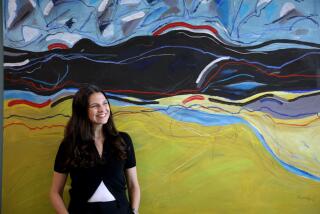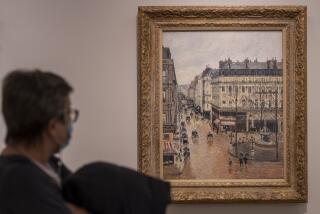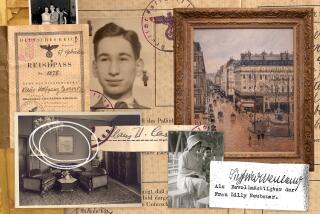Seymour Fromer dies at 87; founder of Jewish museums
Seymour Fromer, who built one of the country’s largest collections of Judaica with little money but enormous drive to preserve the history of Jews, especially those who helped settle the American West, has died. He was 87.
Fromer died Oct. 25 at his Berkeley home following a lengthy illness, said a spokesman for the Judah L. Magnes Museum, which Fromer and his wife, Rebecca, established in 1962.
The museum, housed in a historic mansion in Berkeley, contains 11,000 items, including rare manuscripts, Jewish wedding garments, Torah covers and other artifacts, many of which were gathered by the Fromers during their travels across the country and in Europe, Egypt, Morocco and India.
Named after a San Francisco Bay Area native who was the first rabbi born in the western United States, the museum includes the Western Jewish History Center, a unique archive focusing on the daily life and culture of Jews in 13 Western states.
“Seymour was not interested in the most valuable objects,” said Alla Efimova, the museum’s director and chief curator. “His approach to Jewish history was very egalitarian: Every life had a story and was worthy of being documented. Therefore the Magnes collection is one of the broadest geographically -- documenting Jewish lives in every corner of the diaspora -- and the most eclectic.”
Fromer’s ethnographic impulse influenced the development of other Jewish museums, said Uri D. Herscher, founding president and chief executive of the Skirball Cultural Center in Los Angeles.
Not interested in merely preserving relics, Fromer believed that a Jewish museum could play an important role in maintaining American Jewish identity. “That was a big breakthrough,” Herscher said referring to the idea that museums should “tell a story in the search for an American Jewish identity. So these museums became storytellers using the artifact as the teller of the story.”
Many of the museum’s holdings tell the stories of the prominent Jewish families who helped build California in the Gold Rush era. One of the last items Fromer helped obtain was a portrait of two brothers, Max and Samuel Lilienthal, who emigrated from Germany to San Francisco in the 1840s. Samuel was a pioneering homeopathic doctor and Max was a rabbi who helped create the Jewish Reform movement in America.
The Magnes Museum traces its beginnings to 1960, when Fromer, then founding director of the Jewish Education Council of Alameda and Contra Costa counties, found the graduation picture of Judah L. Magnes in an 1894 Oakland High School yearbook. A year later the Fromers met Magnes’ widow, Beatrice, in Israel and obtained her approval to launch a museum named after him. After outgrowing a room in an Oakland Jewish community center and the loft of a movie theater, it found a permanent home in 1966 in an old mansion on Russell Street in Berkeley.
Fromer served as director of the museum until his retirement in 1998. For many years, he kept his day job with the Jewish Education Council and devoted every spare moment to building the museum’s collection. He prowled Bay Area auction houses and pursued leads in far-flung corners of the world where Jews had once put down roots. “Whenever we had a vacation we would go someplace where there were Jewish historical items to be saved,” he told the Jewish Bulletin in 2003.
His rescue missions sometimes brought danger, such as the time he was briefly placed under arrest by authorities in Morocco, where he had found a collection of Jewish marriage contracts dating back centuries. Another time, he and his wife risked violating Libyan martial law to collect a pair of Torah ornaments.
His other finds included Moroccan Jewish wedding garments and an intricately carved Torah ark from an abandoned synagogue in the Indian seaport city of Cochin (now Kochi).
In 1967 Fromer started the Western Jewish History Center, which became the largest regional repository for diaries, letters, business records, photographs and other artifacts documenting the contributions of Jews to the settlement of California and the West. “That is one aspect of the museum that is quite unique,” said Robert Alter, former chairman of the Jewish studies program at UC Berkeley.
The eldest of three sons, Fromer was born in the Bronx, N.Y., on Oct. 3, 1922. After studying at Brooklyn College and Columbia University, he worked as a school administrator in New Jersey. He moved to California in the early 1950s and settled first in Los Angeles, where in 1955 he presented the Darius Milhaud opera “David” at the Hollywood Bowl. He later relocated to Oakland.
In Northern California he became the catalyst for a number of Jewish community events and institutions. He helped form the Commission for the Preservation of Pioneer Jewish Cemeteries and Landmarks, which has saved seven Gold Rush-era cemeteries. He also mentored young Jewish scholars and artists who went on to found such Bay Area events and organizations as the San Francisco Jewish Film Festival, Lehrhaus Judaica and the National Yiddish Book Center.
“He was every person’s ideal father,” said Harold Lindenthal, a Connecticut businessman who was a recent college graduate when he met Fromer 40 years ago. Despite barely knowing Lindenthal, Fromer quickly gave him a succession of jobs. “When you spoke to him,” Lindenthal said, “you realized the conversation was 1% about him and 99% about you.”
Fromer is survived by his wife, Rebecca Camhi Fromer; their daughter, Mira Z. Amiras; and two grandchildren. The family requests that any memorial donations be sent to the Judah L. Magnes Museum, 2911 Russell St., Berkeley, CA 94705.
More to Read
Start your day right
Sign up for Essential California for the L.A. Times biggest news, features and recommendations in your inbox six days a week.
You may occasionally receive promotional content from the Los Angeles Times.







